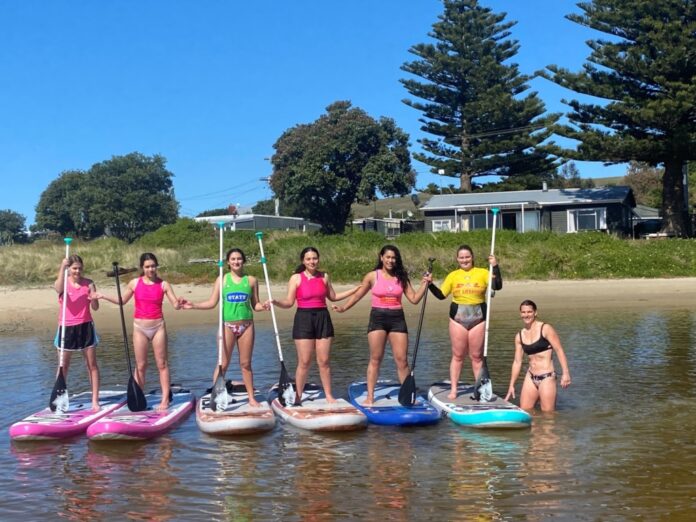Source: Eastern Institute of Technology – Tairāwhiti
1 min ago
The students from the recent Outdoor and Adventure Education [Level 3] programme offered by EIT on an outing to Ocean Beach with their tutor, Kris Harris (extreme right).
Female power has ruled in this year’s cohort of EIT’s Outdoor and Adventure Education [Level 3] with all six students and the tutor being women.
The students had completed EIT’s Services Pathway earlier in the year with the intention of enlisting in either the New Zealand Defence Force or the New Zealand Police.
Tutor Kris Harris taught the young women in the Services Pathway programme and encouraged them to continue into the Level 3 Certificate.
“Normally this course is only run in the summer, but our Head of School saw that these girls weren’t going to get into the defence force until next year. We needed something to keep them engaged and keep them in the outdoors environment. So we put on an extra course this year for them.”
Kris, who was an engineer in the New Zealand Army, says the students, who ranged in age from 17 to 20 years-old, had a good group dynamic.
“We created a really good culture in the first course and then it sort of carried on into this programme. While there were some distractions, it was mostly positive because they kept each other going, made each other come to class every day and kept each other accountable.”
The programme is designed as an entrée to outdoor education and teaches learners the basics of outdoor leadership. It aims to set the learner up for a career as a ranger, tourism guide, or for a role in the search and rescue services or defence force.
Subjects for the fees-free programme have been local tikanga and kawa, kaitiakitanga, preparing and planning an outdoor activity, self-management, physical fitness, water-based activity – paddle boarding, snorkelling, river crossing, land-based activity – mountain biking, tramping, navigation; and communication.
Kris says that while being outdoors is an important aspect of the programme, there is also important theory work to be done.
“They have to do reflections on the activity they have done that day, which includes how they worked as a team, what strengths and weaknesses they saw in themselves and within their team. They have to plan and prepare for an overnight activity. This includes budgeting and what gear they need. And they’ve got to go and find out how much all the gear costs and then a bit of navigation,” she says.
Nineteen-year-old Dominique Morris loved the programme, which she started in June after completing EIT’s six-month Services Pathway programme with the intention of joining the New Zealand Police.
“I was previously doing the Services Pathway, and once that had finished, I was still interested in learning more and developing more skills in the outdoors. So I signed up for this course and I’ve had the time of my life so far.”
“It helped me gain my fitness and learn more things that I am going to need to know once I’m a police officer, like search and rescue and knowledge of the outdoors.
Dominique, who is from Clive and attended Iona College in Havelock North, says she is following a family tradition by joining the New Zealand Police and the last six months has prepared her.
“It has been a challenge for me to balance my work-life as I am a lifeguard and swim instructor at Clive Pools, but the Outdoor programme gives you opportunities that you may not get in your normal everyday life. Through this, I’ve done so many things that I would never, ever have even thought of doing,” says Dominque.
For more details about EIT’s fees-free Outdoor and Adventure Education [Level 3], please go to eit.ac.nz. A new programme begins on EIT’s Hawke’s Bay Campus and Tairāwhiti Campus in Gisborne in January.



